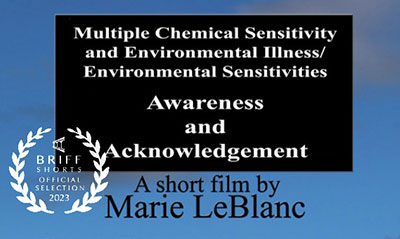 The National Institute of Environmental Health Sciences (NIEHS) is in the process of updating its Strategic Plan. As part of the effort the agency is seeking Visionary Ideas from the public. Mary Lamielle, Executive Director of the National Center for Environmental Health Strategies, Inc., has submitted a proposal (see below) for Research on Chemical Sensitivities/Intolerances. Here’s how you can participate:
The National Institute of Environmental Health Sciences (NIEHS) is in the process of updating its Strategic Plan. As part of the effort the agency is seeking Visionary Ideas from the public. Mary Lamielle, Executive Director of the National Center for Environmental Health Strategies, Inc., has submitted a proposal (see below) for Research on Chemical Sensitivities/Intolerances. Here’s how you can participate:
REGISTER AND VOTE:
Go to: strategicplan.niehs.nih.gov. Once on the website, click “Register” in the right hand corner of the webpage. You’ll need to enter an e-mail address.
To Vote: Go to the left side of the page, about a quarter of the way down to the “Categories.” Click on “Affected/Susceptible Populations”. Scroll down to the proposal for Research on Chemical Sensitivities/Intolerances and click agree.
Please urge your friends to vote for this proposal!
Any questions, please contact Mary Lamielle at marylamielle@ncehs.org or (856) 429-5358; (856) 816-8820.
NCEHS Proposal:
Research on Chemical Sensitivities/Intolerances
Millions of Americans experience severe and debilitating multi-system reactions and intolerances to a panoply of chemicals, over-the-counter and prescription medications, alcoholic and caffeinated beverages, and numerous other substances and products. Approximately 15-30% of Americans report adverse reactions to particular chemical exposures. Those disabled by chemical sensitivities or chemical intolerances (CS/CI) may be as high as 6% of the population. There is a need for population-based studies among exposed individuals using a validated questionnaire; for research on the mechanism by which people develop these sensitivities or intolerances following chemical exposures; for the creation of an interdisciplinary group to develop and implement research on CS/CI, and for the construction and staffing of an Environmental Medical Unit (EMU), a hospital-based research facility, as recommended by multiple professional and scientific meetings and supported by Congress. The Scientific Understanding Work Group, part of the CDC’s National Conversation on Public Health and Chemical Exposures, is the most recent work group report to make detailed research recommendations to investigate individual susceptibility including the use of an Environmental Medical Unit (See Recommendation 7). Clinical investigation of chemical intolerance using an EMU would permit examination of populations affected by toxicant-induced intolerances to determine the biomarkers and mechanisms by which to identify individual susceptibility so as to avoid placing such individuals in hazardous situations, detect affected individuals early in their illness, and provide prompt intervention.









The fact that the CDC is involved, they’re talking about forming an “interdisciplinary group”, the mention of the pharmaceutical industry, and Congress is involved sets off all my alarm bells. I suspect and fear that this will wind up being nothing more than the same sad fiasco with which CFS patients are dealing. The CDC is notorious for writing off people with “unexplained illnesses.” Just ask those with CFS. They have psychiatrists that keep stating CFS is a mental disorder. When they talk about an “interdisciplinary group” for MCS, I’m sure it will include people like Reeves and Wessely. As for Congress, the Chemical Industry lobby is one of the most powerful in the nation. Have you ever investigated just how much money they give to Congressmen every single year? It’s staggering. If you think for one minute that any of these groups are going to go against them, guess again. I strongly suspect that this group’s “research” will determine that this is a somatic disorder.
Where is the funding for all this coming from? Congress had appropriated money to the CDC for CFS research. The CDC instead used the money for other research not related to CFS. They finally got caught. How is this group to be trusted in light of the CDC’s track record and the Chemical Industry’s ownership of Congress? Not to mention the Pharmaceutical Industry lobby and their control of Congress and other groups. They are also one of the largest and most powerful in the nation.
I am just glad to see that there is so much being done about MCS It’s probably going to take some time just like it took time to get restrictions on cigarette smoke even though the negative health affects were well known.
Thanks for letting me know about this vote!
I have been struggling with chemical sensitivities for over a year. None of the doctors in my state, West Virginia, know how to treat or test for this. I think agree that more research needs to be done. I am sure there are many out there like me, with little help and no where to turn.